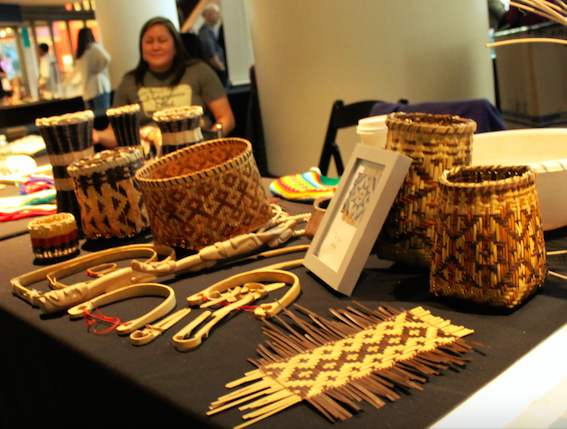
- Details
- By Chuck Hoskin Jr
Guest Opinion. For too many generations, citizens of tribal nations around the country, including Cherokee Nation citizens, saw their language, their culture and their artistic expression suppressed and eroded by policies of the United States. Meanwhile, many non-Indians have profited from art based on stereotypes and misrepresentations of Native Americans.
The federal Indian Arts and Crafts Act, first passed in 1990, finally put some long-needed protections in place. It is a truth in advertising law intended to protect Indian artists and consumers. Unfortunately, the law still defines “Indian” and “Indian tribe” too broadly. Instead of reserving the label of “Indian art” to members of federally recognized tribes, current law extends that protection to state-recognized tribes, which have not passed any of the important federal safeguards against falsely claiming tribal identity.
Recently, I sent a letter urging Congress to strengthen the federal Indian Arts and Crafts Act by reserving its protections to members of federally recognized tribes. I called for Congress to include these changes in the proposed ARTIST Act.
The list of fake tribes and state-recognized tribes is long. At least 10 state-recognized groups across the country make a false claim to Cherokee history and culture. These groups pose as Cherokee tribes and issue membership cards, usually for a fee. Rather than earn federal recognition through a rigorous examination of history, facts and the law, they perpetuate a fraud.
Unfortunately, the Indian Arts and Crafts Act — a law intended to protect Native artists — helps these “tribes” in their quest for legitimacy. Under the law, artists with membership in these fraudulent organizations compete alongside Cherokee citizens in selling art under the federally protected “Indian art” label.
This is an offense to our ancestors, an offense to our artists and confusing to art patrons. As Chief, I will not tolerate it. So, let’s do something about it. Let’s tell Congress that our ancestors endured too much to allow fake tribes to undermine our culture and lifeways. Let’s tell Congress that our artists, and artists in all federally recognized tribes, deserve to be respected. Let’s tell Congress that if a person is going to sell their art as Indian art, they ought to at least be an Indian.
Deputy Chief Bryan Warner and I took an oath of office to preserve and defend Cherokee sovereignty and culture, which are threatened by the countless examples of people falsely claiming Cherokee Nation citizenship and ancestry. Our oath compels us to speak up to federal leaders.
We need your help, too. Genuine Native artists across the Cherokee Nation and across the country need your help. I’m asking you to join me and Deputy Chief Warner in calling on Congress to remove non-federally recognized tribes from the Indian Arts and Crafts Act. The law must be changed to protect actual Cherokees, including thousands of Cherokee artists, artisans and craftspeople who are citizens of the Cherokee Nation, the Eastern Band of Cherokee Indians or the United Keetoowah Band of Cherokee Indians.

Tribes like the Cherokee Nation — which has been continuously federally recognized since the founding of the country — and other tribes and bands recognized later under federal law are the only legitimate tribes. If groups posing as tribes under state law want the unique rights and responsibilities of Indian tribes, including protections for Indian artists, these groups should go through the rigorous process of federal recognition, just like the other 574 federally recognized tribes.
The Senate Committee on Indian Affairs is seeking comment on the proposed ARTIST Act of 2023. Now is the time to push for changes in federal law that give Indian artists the respect and protection they deserve.
You can visit the Cherokee Nation’s Citizen Action website for a template letter showing your support for the strengthening of the Indian Arts and Crafts Act. Email your letter and comments to [email protected]. The deadline to let your voice be heard is Friday, April 14.
Chuck Hoskin, Jr. is the pirncial chief of the Cherokee Nation.
More Stories Like This
The Lie We Keep Telling About Wounded KneeAnother Weapon of Mass Destruction
Colorado cannot heal until it confronts Sand Creek honestly
Native American Mothers Deserve to Live
Technology Rooted in Tradition is Strengthening Cherokee Nation
Help us defend tribal sovereignty.
At Native News Online, our mission is rooted in telling the stories that strengthen sovereignty and uplift Indigenous voices — not just at year’s end, but every single day.
Because of your generosity last year, we were able to keep our reporters on the ground in tribal communities, at national gatherings and in the halls of Congress — covering the issues that matter most to Indian Country: sovereignty, culture, education, health and economic opportunity.
That support sustained us through a tough year in 2025. Now, as we look to the year ahead, we need your help right now to ensure warrior journalism remains strong — reporting that defends tribal sovereignty, amplifies Native truth, and holds power accountable.
 The stakes couldn't be higher. Your support keeps Native voices heard, Native stories told and Native sovereignty defended.
The stakes couldn't be higher. Your support keeps Native voices heard, Native stories told and Native sovereignty defended.
Stand with Warrior Journalism today.
Levi Rickert (Potawatomi), Editor & Publisher

